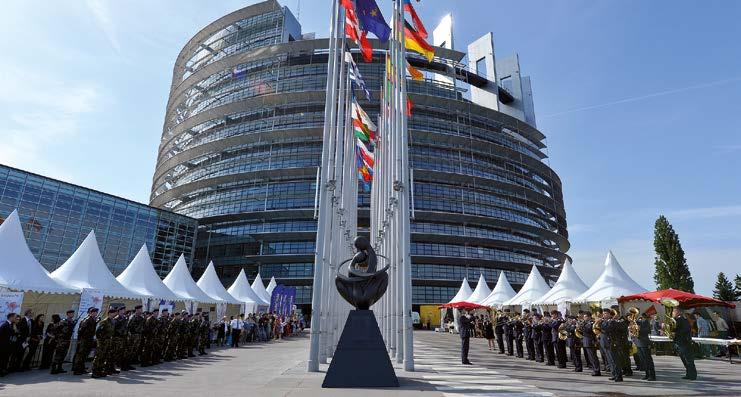THE EUROPEAN – SECURITY AND DEFENCE UNION
Adapting the EU’s security and defence structures Interview with Ioan Mircea Paşcu MEP, Vice-President of the European Parliament, Brussels/Strasbourg
A
mong the Members of the European Parliament, one of the best-informed politicians on security and defence issues is without any doubt Ioan Mircea Paşcu, Vice-President of the European Parliament and former Defence Minister of Romania. We wanted to learn more about this expert and his vision of European security and defence in today’s unstable security environment. In order to find out, Nannette Cazaubon travelled to Mr Paşcu’s home region Transylvania, near the Hungarian and Ukrainian border, to meet with him and discuss current European developments. The European: Mr Pas˛cu, we are meeting here in the county of Satu Mare where you were born and where you started your political career. Today, and since 2007, you are a Member of the European Parliament (EP). In addition to your role as EP Vice-President and member of the Subcommittee on Security and Defence (SEDE), you have been the Coordinator for Security and Defence of the Socialists and Democrats political group (S&D) since 2014. What are your ambitions in tackling all these tasks? Ioan M. Paşcu: Indeed, alas, I am all that!? Well, in my previous “incarnation” as defence minister of Romania at the time of NATO admission (2000-2004), it was simply natural that I wished to become a member of SEDE. Having then become Vice-Chair of the Foreign Affairs Committee (AFET) in 2007, when Romania became an EU Member State, I have witnessed how far defence has come to reach where we are now, and I have tried to bring a contribution through my expertise. If my
42
photo: Jean Cazaubon for ESDU
The time for a serious organisational evaluation is rapidly approaching
work within AFET and SEDE capitalises on my professional background, as Vice-President of the Parliament my mission is more related to running, together with my colleagues, the administrative activity of the Parliament and giving it political direction. The European: And what about your activities as the rapporteur of the S&D Group? Ioan M. Paşcu: Indeed, among other reports on the situation in the Black Sea after the Russian illegal annexation of Crimea, I developed the EP Report on CSDP 2016 and I am now working on the 2018 CSDP Report. The European: A fascinating range of tasks indeed! But, when you became a MEP in 2007, security and defence were issues that the European Commission preferred not to talk about. The only EU body dealing with these issues was the SEDE Subcommittee of the EP, led at that time by Karl von Wogau. What was the reason for the lack of interest in this area? Ioan M. Paşcu: To my mind, the reason was two-fold: on the one hand, Europe was enjoying the serene dream of being “prosperous, secure and free, like never before” as mentioned in its first Security Strategy of 2003, on the other hand, defence and security were then (as they continue to remain today) firmly an exclusive prerogative of the Member States. Consequently, the EP did not need more than a Subcommittee dedicated to these matters. The merit of Karl von Wogau was indeed that he kept the fire alive, grouping together a handful of people – myself included – who felt that defence and security needed more attention than they were getting at the time. The European: Even after the signature of the Lisbon Treaty in 2009, Article 42 dealing with progress on the Common Security

















